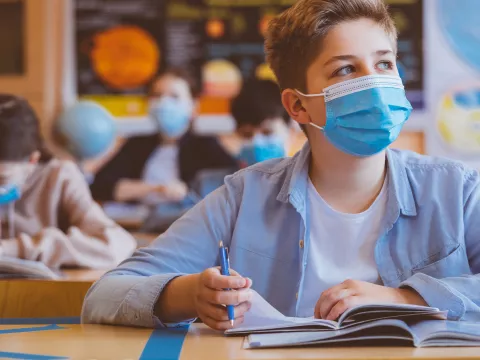- AdventHealth

Kids usually have mixed emotions as summer ends and a new school year begins. They may be anxious to see their friends again and get back to after-school sports or other activities, but at the same time miss the freedom of summer break.
The 2020-21 school year will likely bring a whole new set of emotions as many children had a disrupted end to their previous school year — and a summer spent wearing masks.
If you’re the parent of children who are getting ready to head back into the classroom, here are some ways you can support their physical and mental health.
Navigating New Routines
When your child heads back to the classroom, they’re likely to see some changes from what they remember. Help them understand these changes and why they’re happening, so they don’t become scared or overwhelmed.
The Centers for Disease Control and Prevention (CDC) suggests the following precautions for schools resuming in-person classes:
-
Appropriate wearing of face coverings for those who are able (not recommended for children under two or anyone who has trouble breathing)
-
Encourage staff and students to use tissues when coughing or sneezing and dispose of it right away
-
Remind parents to keep their kids home if they aren’t feeling well
-
Teach and reinforce hand hygiene, encouraging students to wash their hands properly or use hand sanitizer often
It may be helpful to send your child to school with additional supplies, like hand sanitizer and tissues, and teach them the right way to secure their face mask. In addition to these added measures for healthy hygiene, your child may also notice new signage in school, or broadcast announcements over the PA system, to share messages about reducing the spread of coronavirus.
Changes in Extracurricular Activities
While many schools are welcoming students back to the classroom in person, extracurricular activities, such as field trips or after-school sports, may not be the same. Many educators have been advised by the CDC to look into virtual group events, like online museum visits, to limit exposure to other people. Schools are also being asked to limit nonessential visitors, such as volunteers, so extra activities that were once volunteer-led may be put on hold for now.
If your child’s school is resuming youth sports, it’s possible they will need to follow the same hand-washing and face-covering measures that they practice in the classroom. Older children may have an easier time practicing social distancing and healthy habits, but make sure you are reinforcing the importance of cleanliness no matter their age.
Listen to How They’re Feeling
These changes at school may cause your child to react out of the ordinary. It’s important to acknowledge everything your child is feeling, especially at the start of the school year since it tends to cause so much anxiety, and perhaps even more so with the additional changes this year.
Make conversations about your child’s school day an expected part of your family routine. Dinnertime is a great opportunity to ask your child about the best part of his or her day, along with the most challenging aspects. Finding out sooner rather than later that your child is having a rough start increases the chances you can help them turn it around and achieve success in school.
Is your child stressed about the changes in school due to COVID-19? Allow your child to safely experience the range of emotions that come with a new school year. Encourage them to talk openly and don’t dismiss any feelings, even when they seem over-the-top to you. Watch for signs of stress, such as aggression, crying or mood swings. Try to discuss why they may be feeling uneasy and address it with your child’s pediatrician if necessary.
Check on Their Health
Be sure to stay up to date on your child’s checkups and physicals, whether in person or by video visit.
Back-to-school physicals (also called well-child exams) are a chance for the pediatrician to evaluate your child’s growth and development, screen for common childhood conditions and make sure immunizations are up to date.
Before the visit, think about any questions you have related to your child’s health. Maybe you’re worried about your child’s new routine, sleep habits, screen time or fitness level. If so, be sure to write your questions down. Back-to-school physicals can be busy, and it’s easy to forget what you wanted to ask.
When you check-in for your child’s appointment, let the healthcare staff know about your questions so they can give the doctor a heads up.
We’re Here to Help
If you need support in managing the stress of a new school year, or to schedule a physical, find a doctor who will be your child’s partner in whole health today. For more information on children’s care at AdventHealth, click here.


